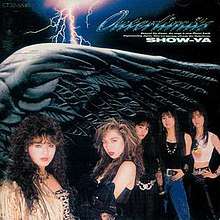Outerlimits
Outerlimits is the seventh album of the Japanese female hard rock group Show-Ya. The album was released on 6 September 1989, in Japan. The album was mixed at the famous Cherokee Studios in California and was arranged by Masanori Sasaji and Show-Ya. Lyricist Yoshihiko Andō wrote most of the lyrics for the songs of the album. This is the band's best selling album, with more than 100,000 copies sold in Japan.[1] The first single "Genkai Lovers" (限界 Lovers) sold more than 30,000 copies in Japan, being used for a commercial campaign.[2]
| Outerlimits | ||||
|---|---|---|---|---|
 | ||||
| Studio album by | ||||
| Released | 6 September 1989 | |||
| Recorded | June–July 1989 | |||
| Studio | Music Inn Yamanakano, Freedom Studio, Tokyo, Japan | |||
| Genre | Hard rock, heavy metal | |||
| Length | 47:31 | |||
| Language | Japanese | |||
| Label | Eastworld / EMI | |||
| Producer | Show-Ya | |||
| Show-Ya chronology | ||||
| ||||
| Singles from Outerlimits | ||||
| ||||
Reception and charts
| Review scores | |
|---|---|
| Source | Rating |
| AllMusic | |
Alex Henderson in his review for AllMusic defined the Japanese album "well worth searching for" for every metalhead, comparing the songs of Show-Ya to the works of Ozzy Osbourne, Iron Maiden, Heart and Lita Ford.[3]
The album was a huge success in Japan, reaching number three in the national charts (Oricon chart).[4] The first single "Genkai Lovers" (限界 Lovers) sold more than 30,000 copies in Japan, while the second single "Watashi wa Arashi" (私は嵐) was the best-selling CD single of the band, reaching position No. 12 in the Oricon single chart.[5]
Track listing
- "Out of Limits" (Miki Igarashi, Yoshihiko Andō) – 3:09
- "Look at Me!" (Show-Ya, Keiko Terada & Andō) – 5:11
- "Genkai Lovers" (限界 Lovers) (Terada & Igarashi, Andō) – 3:59
- "Trouble" (Terada, Andō) – 4:06
- "Yasei no Bara" (野性の薔薇) (Igarashi, Andō) – 5:31
- "Inori" (祈り) (Terada, Terada & Andō) – 4:37
- "Kaigenrei no Machi – Cry for the Freedom" (戒厳令の街 /Cry for the Freedom) (Miki Nakamura, Andō) – 4:52
- "Bad Boys" (Satomi Senba & Miki Tsunoda, Andō) – 3:58
- "Watashi Wa Arashi" (私は嵐) (Terada, Andō) – 4:05
- "Paranoia Paradise" (Senba & Tsunoda, Andō) – 3:19
- "Battle Express" (Igarashi, Andō) – 4:31
Personnel
Band members
- Keiko Terada – vocals
- Miki Igarashi – guitars
- Miki Nakamura – keyboards
- Satomi Senba – bass
- Miki Tsunoda – drums
Production
- Atsuhiro Sakamoto – engineer
- Toshimi Naseki – assistant engineer
- Paul Wertheimer – mixing at Cherokee Studios, Hollywood, California
- Bernie Grundman – mastering
- Masanori Sasaji – arrangements
- Yoshihiko Andō – lyrics
References
- "RIAJ Searchable Database: search for September 1989". Recording Industry Association of Japan. Retrieved 6 August 2018.
- "Show-Ya - Outerlimits". Metal-Archives.com. Retrieved 23 March 2010.
- Henderson, Alex. "Show-Ya Outerlimits". AllMusic. Rovi Corporation. Retrieved 15 June 2011.
- SHOW-YAのアルバム売り上げランキング (in Japanese). Oricon. Retrieved 8 September 2014.
- SHOW-YAのシングル売り上げランキング (in Japanese). Oricon. Retrieved 8 September 2014.